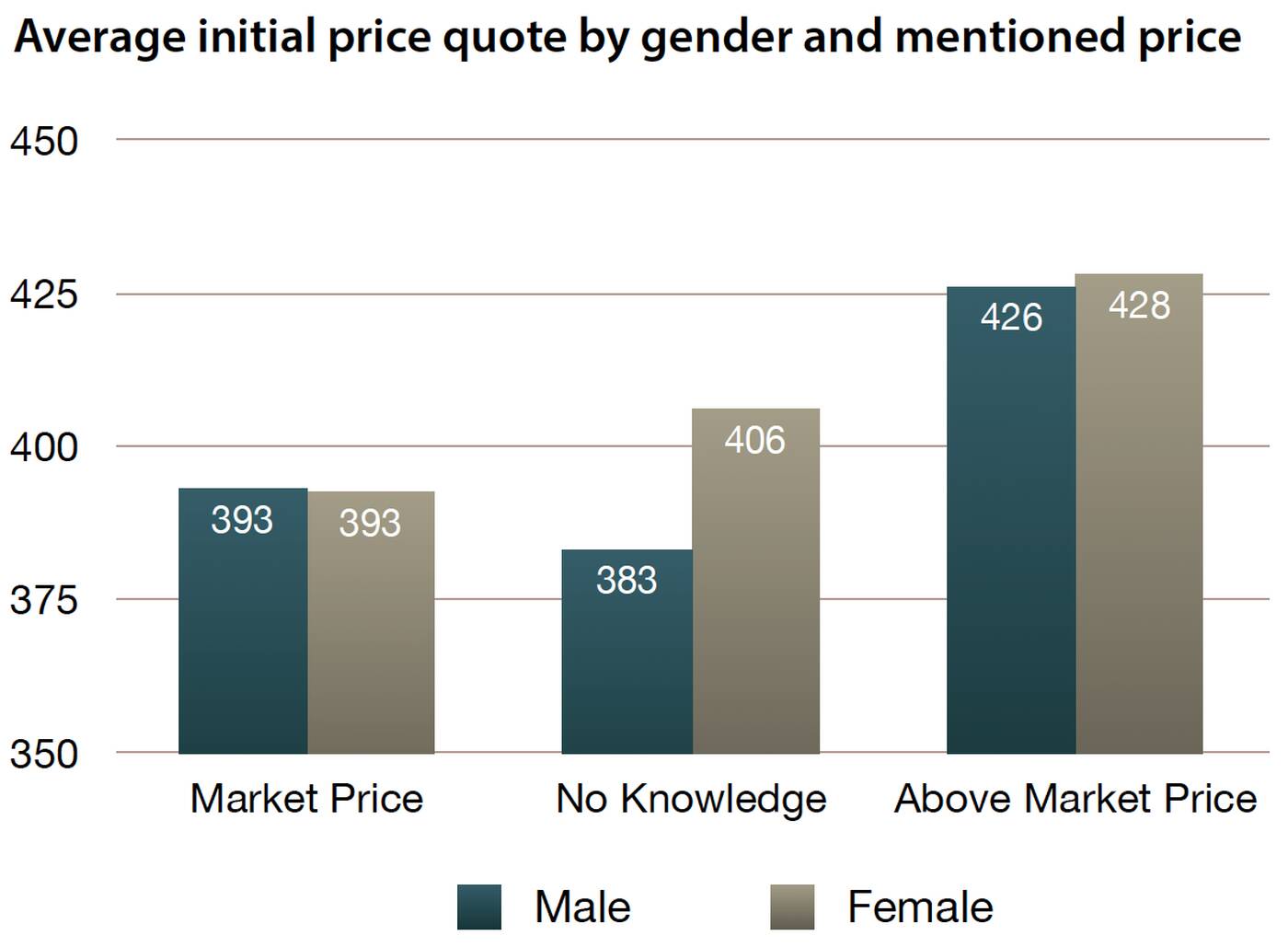Featured Faculty
Associate Professor of Strategy
Nancy L. Ertle Professor of Marketing; Faculty Director, Program on Data Analytics at Kellogg

Mykyta Dolmatov via iStock
Few industries inspire more dread in Americans than the car industry. It is not the product we dislike, of course, but the haggling—specifically, the dogged suspicion we are haggling poorly. As soon as we have driven our new convertible off the lot, we wonder, will our salesman laugh at our naivety? Is the mechanic who sold us a replacement part taking advantage of us?
Across all industries, “customers vary in how informed they are about prices, how good they are at searching out prices, and how much they care about getting good prices,” explains Meghan Busse, an associate professor of management and strategy at the Kellogg School. “Some people are really bargain hunters. They have the time; they like doing it. Some people don’t care. They just want to be convenience shoppers. Stores know this and they set different prices. Some set high prices, knowing they’re going to sell only to the convenience shoppers; some set low prices knowing they’re also going to get the bargain hunters.”
Dangers of Information Asymmetry
Yet additional dynamics come into play in industries where prices are unlisted and thus open to negotiation. Generally, it is enough to know whether a posted price is competitive. But when negotiation is involved, how informed or price sensitive we are may actually influence the price we are quoted. “This is why people hate these interactions,” says Busse, “and this is why the Internet has been so important in car buying over the last 10 to 15 years.” Sites like Edmunds.com, TrueCar, or Cars.com all provide prospective buyers with information about market prices for particular makes and models.
Not so, however, for auto repair. “Auto repair is one of the last vestiges in which there is a tremendous amount of information asymmetry going on between consumers and firms,” explains Florian Zettelmeyer, the Nancy L. Ertle Professor of Marketing at the Kellogg School.
This lack of transparency may change, however—at least if companies like AutoMD.com have their way. AutoMD.com employs “mystery callers” who ring up repair shops to inquire about prices, and then calculate market rates for common services—rates the rest of us can use to inform ourselves.
But just how important is being informed? Or, to be more precise, how important is the appearance of being informed? Busse and Zettelmeyer, along with Ayelet Israeli, a doctoral student at the Kellogg School, decided to team up with AutoMD.com to determine whether auto shops would quote different prices to informed and uninformed callers.
Is Naivety Harmful?
In their study, experienced mystery callers contacted hundreds of auto repair shops and read from a script. How much would the shop charge to replace the radiator on their 2003 Toyota Camry? In one condition, the callers announced that they had an accurate market value for the service in mind: “I just visited the website AutoMD.com, and for this area they say the cost should be $365 to replace the radiator on my car.” In another condition, callers announced that they had an unrealistically high value in mind: “I just visited the website AutoMD.com, and for this area they say the cost should be $510 to replace the radiator on my car.” Finally, in a third condition callers revealed that they did not have a number in mind at all: “I have no idea how much it is to replace a radiator.”
Although revealing yourself to have bad information works to your disadvantage, revealing yourself to be price savvy does not seem to provide you with any advantage at all.
The researchers found that callers who suggest a price that is higher than market value are quoted back a significantly higher price than other callers, as you might expect. But, says Zettelmeyer, “we can’t find a statistical difference between whether you say you have no idea versus whether you [suggest] the price quote $365.” In other words, although revealing yourself to have bad information works to your disadvantage, revealing yourself to be price savvy does not seem to provide you with any advantage at all.
It’s a Man’s World
But then the researchers noticed something else. When they examined the price quotes given to male and female callers separately, a different pattern emerged (see the figure below). For male callers, there is no difference between having “no idea” about an expected price and being a savvy consumer: either way, you are quoted something right around market price. But for female callers, says Zettelmeyer, “you’re much worse off saying you know nothing as opposed to quoting the price of $365.”

Why would a man with no knowledge be treated differently from a woman with no knowledge? One possibility is that, from a shop’s perspective, the admission means something different when spoken by a man. “If you say ‘I have no idea’ and you’re a woman, you really have no idea,” posits Zettelmeyer. But if you are a man, “maybe you’re being really strategic,” says Busse. You must have some idea; you may even be testing the shop.
Another possibility? Shops may assume that a potential customer with “no idea” about pricing is simply at the beginning of a search process. If the shop believes that women will not search as long for an acceptable price—or will conduct the search less effectively—then the shop may quote less competitively.
The Role of Stereotypes
Interestingly, the researchers also found that when a caller provides a number—be it the reasonable $365 or the absurdly high $510—all gender differences disappear.
This, says Busse, suggests that repair shops probably do not inherently dislike women or take pleasure in ripping them off. Instead, the data are more consistent with statistical discrimination. Shops believe, rightly or wrongly, that women know less about cars and car repair. In the absence of information to the contrary, they will be offered a higher quote. “But when you show that stereotype is wrong”—because you reveal yourself to be an informed woman or an uninformed man—“you get treated the same way,” says Busse.
Finally, the researchers wondered how often shops would agree to a lower price if a market rate was not originally offered. And once again, when they looked at data collected by the mystery callers, the results surprised them.
For the most part, shops refused to budge from their initial price. But among the shops that did offer a price concession, an interesting gender difference emerged. “Essentially what we found is that women are more likely to obtain a match [to a lower price] than men are,&rdrdquo; says Zettelmeyer. Specifically, female callers who requested a lower price obtained it about 35% of the time, while men only did 25% of the time—a “pretty sizeable” difference. These results cannot be explained by women initially being quoted higher prices.
So what can explain this result? Consider that most of the shop employees were male. “It may be that men are more likely because of social or cultural conditioning to respond positively to requests made by women,” the researchers write. (Though chivalry is an admittedly odd explanation, given that women were offered higher prices to begin with.)
Alternatively, it could be that shops are surprised by the idea of a woman haggling over prices. “If on average women don’t ask [for a lower price], but this woman is asking, that’s quite different from what’s normally expected,” explains Zettelmeyer. Men, on the other hand, are expected to ask. If a man asks for a lower price, a shop employee will not necessarily cave. Says Busse, “But a woman who actually pushes me? I believe she is actually going to walk out of the door if I don’t give her a good price.”
How to Finagle the Best Price
The study offers some obvious strategies for customers interested in finding the best prices. If you are a woman, the smartest thing you can do to get a good deal is to shop around, either online or by phone. Once you have gathered some information, “when you call each additional shop,” says Busse, “reveal that you know what you’re talking about—that you know the car, you know the repair, and you know what a sensible price is—right off the bat. And if you get a price that’s above that, ask for a discount.”
The task is a bit easier for men: You are already assumed to have a good idea about what constitutes a fair price. But you would be wise to avoid engaging in any behavior that reveals otherwise.
Busse, Meghan R., Ayelet Israeli, and Florian Zettelmeyer. 2013. “Repairing the Damage: The Effect of Price Expectations on Auto-Repair Price Quotes.” Mimeo. Kellogg School of Management, Northwestern University.